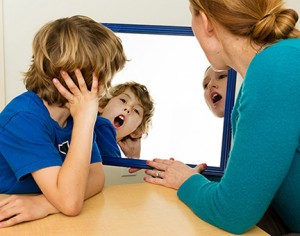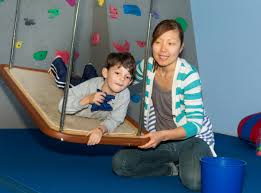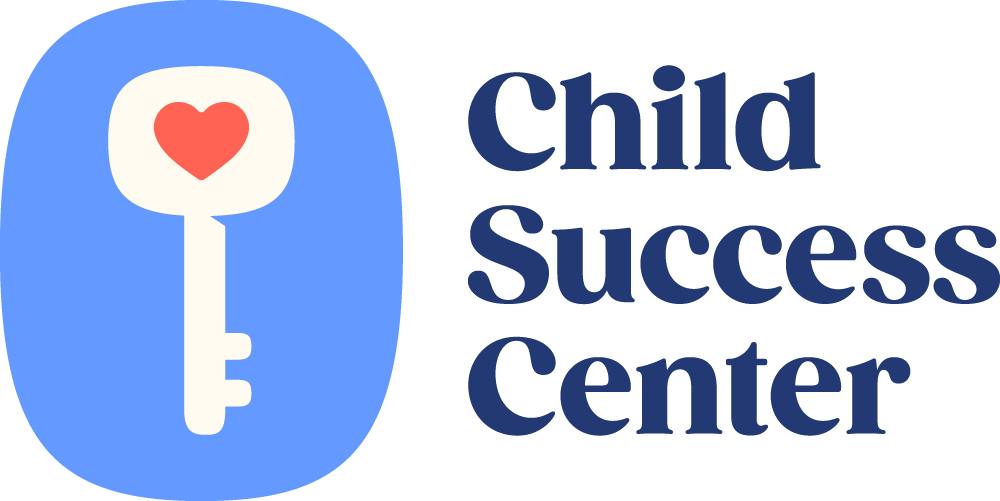Childhood Communication Issues
It’s understandable that nothing is more disheartening to a parent than to think that their child is developing less than perfectly in every way, but it is part of being human. We all develop at different rates and in different ways. Just as babies require help developing the skills needed to feed themselves, sometimes children also greatly benefit from help overcoming communication issues.
Communication issues can manifest themselves in how a child speaks or how they understand speech. As a side effect of communication issues, children who have trouble communicating their thoughts or feelings, or children who have trouble processing the meaning or clarity of what is being said to them, often can become frustrated and act out with unexpected or unwanted behavior. Parents who are dealing with both communication issues and unwanted behavior often see a dramatically happier and more expressive child soon after treatment begins.
The role of therapists in treating childhood communication issues.
To better understand the challenges and treatment process, it helps to understand the focus and role of different therapy professionals such as occupational therapists and therapists that work with speech and language difficulties.
Occupational therapists work with children who have sensory processing disorders (SPD). A child with SPD will find it difficult to process and act upon sensory information, creating challenges in performing daily tasks.
The Vestibular System and Auditory Processing and Language Disorders
One of the most basic of all the sensory systems is the vestibular system. As described by noted author and therapist Carol Stock Kranowitz, M.A. in her 2009 book, The Vestibular System and Auditory-Language Processing: “The vestibular system coordinates body movements, maintains balance and equilibrium, and helps children develop normal muscle tone.” She further writes, “The vestibular system plays a significant role in the development of language, so that children with vestibular dysfunction may also have auditory-language processing difficulties. The two systems work together as they process sensations of movement and sound. The two systems are closely connected because they both begin to be processed in the receptors of the ear.”
While occupational therapists treat children with vestibular dysfunction, speech therapists work with children who have auditory processing difficulties and language disorders. Some auditory processing skills include auditory discrimination (differentiating among sounds), auditory figure/ground disturbance (discriminating between sound in the foreground and background) and language.
Language Disorder
When a person has trouble understanding others (receptive language), or sharing thoughts, ideas, and feelings (expressive language), then he or she has a language disorder.
Speech Disorder
When a person is unable to produce speech sounds correctly or fluently, or has problems with his or her voice, then he or she has a speech disorder.
 Speech therapists provide therapy to children with speech disorders. Kranowitz further explains, “Language and speech are closely related, but are not the same. Speech is the physical production of sound. Speech skills depend on smoothly functioning muscles in the throat, tongue, lips, and jaw. The vestibular system influences motor control and motor planning that are necessary to use those fine muscles to produce clear speech.”
Speech therapists provide therapy to children with speech disorders. Kranowitz further explains, “Language and speech are closely related, but are not the same. Speech is the physical production of sound. Speech skills depend on smoothly functioning muscles in the throat, tongue, lips, and jaw. The vestibular system influences motor control and motor planning that are necessary to use those fine muscles to produce clear speech.”
Overall, the child with vestibular dysfunction frequently develops problems with speech and language. Here are some common characteristics of children with poor speech, language, and/or auditory-language processing:
- May have trouble discriminating between sounds, such as the difference between “comb” and “cone.”
- May have trouble attending to, understanding, or remembering what she reads or hears.
- May misinterpret requests, frequently ask for repetition and be able to follow only one or two instructions in sequence.
- May have trouble putting thoughts into spoken or written words.
- May talk “off topic,” e.g. talk about his/her new shirt when others are discussing a soccer game.
- May have trouble “closing circles of communication,” i.e. responding to others’ questions or comments.
- May have weak vocabulary and use immature sentence structure (poor grammar and syntax).
- May have difficulty speaking and articulating clearly.
- May improve her speaking ability after she experiences intense movement.
 According to Kranowitz, “Moving activates the ability to speak. A child with vestibular and language problems benefits greatly from therapy that simultaneously addresses both types of dysfunction. Speech therapists report that just putting the child in a swing during treatment can have remarkable results. Occupational therapists have found that when they treat a child for vestibular dysfunction, speech-and-language skills can improve along with balance, movement, and motor planning skills.”
According to Kranowitz, “Moving activates the ability to speak. A child with vestibular and language problems benefits greatly from therapy that simultaneously addresses both types of dysfunction. Speech therapists report that just putting the child in a swing during treatment can have remarkable results. Occupational therapists have found that when they treat a child for vestibular dysfunction, speech-and-language skills can improve along with balance, movement, and motor planning skills.”
The development of communication skills begins in infancy. Any communication issue is likely to have a significant effect on the child’s social and academic skills and behavior. The earlier a child’s speech and language problems are identified and treated, the less likely it is that problems will persist or get worse.
An in-depth overview of the vestibular system can be found in the book by Carol Stock Kranowitz, M.A. (2009), The Vestibular System and Auditory-Language Processing.
Parents are also urged to contact Child Success Center to learn more about the treatments and therapies available to help their child. CSC can be reached at 310-899-9597
